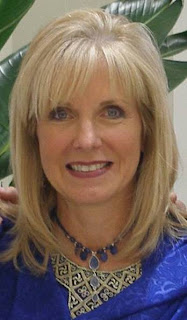
While backpacking near the Continental Divide in SW Colorado with my husband and a couple of friends, our group encountered a steep and treacherous trail that was a six mile ascent to our first day’s destination – a valley where we were to set up a base camp. Loaded with a little more than half my body weight in my pack, the rocky winding trail required constant attention. I found myself staring intently at the trail, searching for the next secure step upon which to place my muddy boot. At one point, totally out of breath, I paused on the trail for a brief rest. Motionless for a moment, I finally felt secure enough to lift my eyes from the trail to explore my surroundings. Turning my back to the mountain, I gazed across the vast valley below. The lush valley was surrounded by rugged snowcapped peaks that towered like mighty giants over the flowered fields beneath their feet. Tall elegant pines of deep forest green stood erect like exclamation marks declaring praise to their Creator and salute to the powerful giants that loomed above them. I was awestruck. And I was stunned to realize that I had been walking with this potential view for quite some time, unnoticed because the trail demanded my intense focus to my own feet upon the sod.
It is a similar season in the life of GCPN – a time of steep climb up an unfamiliar path that is demanding a lot of intense focus and attention. It seems I spend literal weeks trying to ascend the challenges of establishing two non-profit organizations, develop processes and procedures, set up accounting systems, produce documents, develop contracts, design assessment teams, obtain and produce training materials, and occasionally feed my family and smile.
Today Ashley came by my office to visit. She is preparing for her June departure from our church to serve in one of the most challenging countries in the world. Like a graceful arrow propelled from the bowstring of her church body, she will land among a downcast people with a message of hope tied to her shaft. Her free and genuine smile was captivating. The beauty and joy she emotes in her obedience poured forth from her like a refreshing fountain. In those moments my eyes were lifted from the trail beneath my feet to gaze upon God’s majesty that has been surrounding me all along.
With gratitude to the Father I can stop to gaze at my surroundings and assess how far we’ve come:
- Two non-profits have been established which can be utilized by any church in our network for sending its people into the world.
- Generic processes have been developed and will soon be available to all churches in the network to position them for sending.
- Monies are being set aside to support other national believers in reaching their own people or sending them to a lost world.
- Monies are being channeled to GCPN to be shared with network churches who want to send their own people but lack sufficient resource.
- An assessment team is already functioning to provide medical, dental, psychological and educational assessment to families and individuals who are being sent from our churches.
- Interns are in the process of training and serving in our Global Learning Laboratory.
- Others who feel the call to serve in cross-cultural scenarios are being aligned for preparation and training.
- GCPN interns are taking a pre-commission mission trip into an unreached area of the world.
- God is being glorified through the lives of obedient people.
The climb is by no means over. This life of obedience will be a continuum of climbs, level places and even occasional descents. But to maintain view is crucial. Let us pause. Let us raise our Ebenezer and proclaim with our eye fixed on the Summit, “Thus far has the Lord sustained us.”
Walking in faith with you,
Cindy
In the past few editions of the GCPN Communiqué we have been discussing the Essential Roots of a Missional Church. The following article, focusing upon World Awareness, has been submitted by Bill Wimberley, Perspectives Area Director, Austin, Texas. Bill is the President and COO of Preserche Life Sciences, LP and a member of Austin Stone Community Church. He and his wife, Toni, are mission mobilizers who have served in North Africa, Middle East, China and Central Asia.
In Pursuit of World Awareness
By Bill Wimberley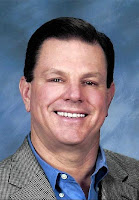
In his 2005 best selling book, The World is Flat, Thomas Friedman sets out to prove that the world is indeed flat (and getting flatter) . . .at least from the perspectives of communication, business and commerce. He begins his book with the following quote from Christopher Columbus’ diary at the outset of his famous voyage in 1492:
“Your Highness, as Catholic Christians, and princes who love and promote the Holy Christian faith, and are enemies of the doctrine of Mahomet (Muhammad), and of all idolatry and heresy, determined to send me, Christopher Columbus, to the aforementioned countries of India, to see the said princes, people, and territories, and to learn their disposition and the proper method of converting them to our holy faith; and furthermore directed that I should not proceed by land to the East, as is customary, but by a westerly route, in which direction we have hitherto no evidence that anyone has ever gone.”
Clearly, heading westerly was not Columbus’ first choice, but since the traditional trade routes of Spain and other European countries to the Far East had been effectively seized and blocked by the followers of Muhammad, Columbus was forced to head into a direction that he was sure no one has ever gone before. Columbus was convinced the world was round. Therefore, he would eventually make his way to India and accomplish his mission. Little did he know that the world was much greater in circumference than he had calculated. As Americans we are reminded often of his misjudgment of fact – he dubbed the curious new people he met upon reaching land, Indians.
With a similar sense of mission that had characterized Columbus, Christian missionaries that followed him to other distant lands endured great hardships, disease, separation from family for years, and even death in the pursuit of their God-given calling. Little was known about far-off lands and their peoples in the early days of William Carey, Hudson Taylor, Cameron Townsend, Lottie Moon, and others. Transportation was difficult, communication was slow to non- existent, medical supplies were rare, languages were unknown and cultures were misunderstood. Yet, these brave souls set out on faith journeys compelled by the conviction that they had been crucified with Christ and it was no longer they who lived, but Christ who lived in them. These were true pioneers of the faith who were sold out to Christ and His purposes. . . regardless of the obstacles!
So, what does a secular book like Friedman’s have to do with modern day missions and completing the task of the Great Commission? Perhaps more than you think. You see, Friedman was out to prove that a variety of global factors have effectively flattened the world and leveled the playing field in many respects. He comes to the conclusion that there are some aspects of this flattening that are good. Some are bad. And some are terrifying. None the less, they are a reality of a rapidly changing world and we must understand them. Since the days of William Carey our world has seen unprecedented advances in communication, computer technology, travel efficiency, shipping and distribution effectiveness, etc. Globalization, urbanization, free trade agreements, nation formation, regime change, and other such factors are effectively shrinking (or flattening) our world . . .right before our eyes. Friedman is no missioligist, but the realities he and other world observers are pointing out to us should be carefully considered and studied as we reflect on the mandate of completing the task of the Great Commission.
Churches committed to a missional perspective need to be aware of the current state of missions. For instance . . . according to the World Christian Database (
World Christian Database), and the Lausanne Committee for World Evangelization (
lausanne ), we find some surprising statistics our churches should be made aware of:
- Despite Christ’s command to evangelize, 67% of all humans from AD 30 to the present day have never even heard His name.
- 648 million Christians today (called Great Commission Christians) are active in Christ’s world mission; 1,352 million Christians seem to ignore this mission.
- Non-Christian countries have been found to have 227 million Bibles in place in their midst, (more than needed to serve all Christians) but they are poorly distributed.
- 124 million new souls begin life on Earth each year, but Christianity’s 4,000+ foreign mission agencies baptize only 4 million new persons a year.
- 91% of all Christian outreach/evangelism efforts are expended in World C locations, where the Gospel is already rooted and the church is thriving.
- 818 different un-evangelized, ethno- linguistic peoples have never been targeted by any Christian agency to date.
- 40% of the church’s entire global mission resources are being deployed to just 10 overly-saturated countries already possessing strong citizen-run home ministries.
- 98.7% of people have access to scripture in 6,700 languages leaving 78 million in 6,800 languages with no access at all.
- Only 1 out of every 4 missionaries is working in a pioneer ministry among non- Christian peoples of the major religious blocs.
- Of foreign mission giving, 87% goes toward work among those already Christian, 12% goes for work among already evangelized non- Christians, and 1% goes for work among people groups in the un-evangelized or unreached category.
- Out of 648 million Great Commission Christians, 70% have never been told about World A’s 1.6 billion un-evangelized individuals.
- Every place on Earth can reasonably be targeted with at least 3 of the 45 varieties of effective evangelism.
These statistics do not diminish the extraordinary efforts of the faithful, but it does give some indication of the task yet remaining for the evangelical church.
In 1976 Francis Schaeffer posed a question for his generation, in his book How Should We Then Live? Whether you agree or disagree with Schaeffer’s conclusions, he asks an important question for every generation to consider. Based upon the facts and realities of this world in this age, how should we then live? What is our responsibility in the face of a rapidly changing world? Could the “flattening” of our world represent an awesome opportunity to finish the task?
Over the last two years, my wife and I have made several vision trips to places including North Africa, China, Central Asia and the Middle East. We visited numerous countries and observed some extraordinary mission projects – most within the least reached areas of the world. With respect to the flattening world, we observed the following:
- Air travel to and from was easy, relatively painless, and often cost less than flying across the U.S.
- Communication in and out of the countries was easy with ready access to telephone and internet. . . even in the most ancient and remote of settings. Case in point . . . Afghanistan has over 1 million cell phone subscribers!
- Shipping of materials and supplies was uncomplicated and inexpensive, in most cases.
Everywhere we have gone, the majority of homes (from mud hut to shack to city apartment) have a satellite TV access.
- The language of business and commerce was similar. Western business was considered supreme and was highly regarded and coveted.
- English was considered the language of success and prosperity. Although ancient cultures and languages remained – indigenous peoples also wanted to know English.
- Among illiterates, story-telling and other oral communication was highly effective.
- In Morocco – one of our least-reached areas – new Free Trade Agreement is paving the way for unprecedented commerce and business cooperation with the U.S. Other opportunities for free trade and business are emerging across the 10/40 Window.
Even a casual study of history, the growth of the Christian church, and our Bible reveals that none of this has caught our sovereign God by surprise. And none of it is out of His control. Quite the contrary, God, Himself, is “flattening” our world and changing its dynamics for His purposes and for His glory. Today we know more about the least reached peoples of the world than ever before. We have more access to closed countries (even if only by satellite TV, radio or Internet) than ever in history. Business and commerce advances are opening unprecedented doors for Kingdom-minded business people. Even the unfortunate tragedies of war and natural disaster are opening up opportunities for the Gospel in places and among peoples that have in the past been beyond our reach.
Our response? We must become World Christians – knowledgeable of world events, ready for world access, and seeking opportunities to leverage the resources we have at our disposal. We should explore what God is masterfully doing to open avenues for the Gospel. We must partner with other members of the Body of Christ, particularly growing indigenous churches, and work together. Never in history has there been more opportunity for the spread of the Gospel!
Is the world round or flat. . . yes! And, yes, we should care!
Bill Wimberley
Do you ever feel that you’ve somehow fallen into a fast stream and are being swept along toward some great end that you cannot envision nor attempt to control? Or perhaps you have caught the crest of the Spirit’s wave and ridden it to a golden shore? You open your e-mail and find connections you never dreamed of and would have never known to seek out on your own that enable you to accomplish God’s will as He has revealed it to you? I don’t know about you, but I love seasons in which I am running to keep up with God – seasons in which He is apparently working, arranging, aligning and enabling so that his children have the joy of being participants in His accomplished will.
I pinch myself every now and then to see if it’s real. Yes, my church, FBC Arlington, will be sending out its first missionary in June and there is a line assembling behind her, preparing to come out the chute into the unreached world soon. In God’s time.
Cottonwood is faithfully preparing to send yet two more missionary units out this summer and God is assembling a force of front-line people from that church who will go out in God’s time. I laughed in the GCPN Board of Directors meeting last month when Mike Fritcher said, “The only numerical goal I have is the number of missionaries I want to see come out of my church!”
First Baptist Plano has landed right in the middle of God’s will! They have been surprised by joy to discover the people group God has chosen for them to work among. Jerry Carlisle shared his sense that God has some amazing challenges in store for his church as they join him in sharing Christ’s love with this people.
 We are living in a new era. It is a season of the reclamation of the commission task and the re-marriage of the local and sent church. It is challenging. It requires faith. It is work. But it’s of God. And God has never asked His church to do anything He didn’t enable her to do. I am praying for each of you to experience God’s power and presence as you lead your church in obedience to His call.
We are living in a new era. It is a season of the reclamation of the commission task and the re-marriage of the local and sent church. It is challenging. It requires faith. It is work. But it’s of God. And God has never asked His church to do anything He didn’t enable her to do. I am praying for each of you to experience God’s power and presence as you lead your church in obedience to His call.
Press On!
Cindy Wiles,
Executive Director
As part of our series, Essential Roots for the Missional Body of Believers, we will focus on the essential role of authentic worship. The following article has been submitted by Barry Rock, Associate Pastor of Music and Worship at First Baptist Church of Arlington, Texas.

How does real worship in a local Body of Christ help to lay a foundation for leading that Body to share the Gospel at home and abroad? In searching my own soul, I found there a vast number of answers and questions pertaining to this central issue. I have chosen six words that seem to help me in my understanding. I hope they serve to spur you to think about the role of worship in your own life and church.
1. Focus
At its core, worship is an act of focus. It is a conscious decision to set aside the noise of the world and to concentrate upon the majesty of the Creator. In that act of willful-focus we may uncover a multitude of things. Among them: our own inadequacy, the transcendent love of a Savior, the reframing of our ambitions, the power that only God can provide, clarity of thought, overwhelming awe and appropriate fearfulness. At the end of it all, however, is the undeniable knowledge that the aim of life is not seeking our pleasure but God’s. Our chief aim is to please Him. All else fades when we truly find those moments of self- abandoned worship. In that God-focus, we find that we cannot live without Him and, by extension; neither can or should anyone else.
2. Appreciation
Worship causes us to appreciate who God is and what He has done. It causes us to look beyond ourselves and appreciate the uniqueness of those around us, realizing that Christ made them who they are. Often, churches that find their worship to be divisive have never explored this issue. As humans, we are prone to think first about our own needs, desires, tastes and abilities. It is difficult to push past that wall. Our tendency, unfortunately, is to filter God’s message through those proclivities. That can lead us to believe that whatever deviates from our own particular views of worship, its meaning and forms, is not true worship and is to be held suspect or even disdained. True worship is of the heart. God sees into the being of the worshiper—something I cannot do. God-focused worship leads us to appreciate the truth in each individual believer. As we learn to appreciate the beauty of the worship of others on our pew, we are one step closer to realizing the diversity of world-Christians, their needs and expressions of faith. We are also one step farther from provincialism and selfishness.
3. Unity
Authentic worship is an act of unification. Real worship ALWAYS draws the members of the Body closer together. That it is not to deny discipline, discussion and disagreement, but, in its essence, worship is unity. The protons and neutrons of the local church rotate relentlessly about the nucleus of worshiping God. In that unity, we are asked not so much to give up our personal tastes, likes and dislikes and opinions, as to subjugate them to the greater good: the realization that we ought to learn appreciation for the gifts and needs of those who sit next to us. Real worship pushes us beneath the superficial and asks us to sense as God senses. In that unity we celebrate and support the variety of tasks necessary to expand and keep healthy the Kingdom. We, hands, ears, feet and mouths, truly become one glorious Body. I believe that the unity found in worship heightens our desire to draw others into that Body. When we know His love and the acceptance of fellow believers, we ache that others may know this same love and acceptance.
4. Heart
The more time we spend with God the more His heart becomes our own. Just like children become reflections of their parents, so we become reflections of our heavenly Father. In worship, we ask God to reveal Himself. When He does, we are changed. A part of me wants to say “forever changed.” I omitted that. I do believe that in salvation there are parts of us that are changed once and for all. But, self- awareness causes me to realize there are many things within my own heart that need to be re-examined and revisited. We must die to ourselves daily. A one-time worship experience is not what we need. Rather, we need regular times of private and corporate worship when God can show His power and grace anew. Our hearts are infinitely adjustable and, as that great hymn states, “prone to wander.” Disciplined lives of worship result in hearts with God- perspective. Our hearts before His throne begin to comprehend the world around us apart from our own selfishness and need. He “tunes our hearts” to sing His praise. Our hearts, touched by His love, grace and mercy, long to sing into the hearts of others who have not heard. The psalmist said, “Change my heart, O God.” That is exactly the result of authentic worship.
5. Story
A part of our corporate worship is the retelling of the story of salvation. By the perpetuation of those stories of faith, we proclaim to all who He is and what He means to us. We are instructed to tell our children, share with others, proclaim the good news, carry the Gospel to the ends of the earth—we are instructed to tell, retell and keep on telling the message of salvation. As we do that in worship, we see people won to Christ in our midst. We also stoke the fire in the hearts of believers to be missionaries at home and around the world. Who among us hasn’t been moved by the testimony of another as they reveal God’s power to save in their own lives? Our neighbors, our co-workers, our classmates, our nation, our world, need to hear THE Story. In our worship we find and share power in a corporate celebration of who God is and what He has done.
6. Foundation
The health of a local church is in direct proportion to the health of its worship. The health of mission efforts at home and abroad is in direct proportion to the health of local churches. The syllogism is clear: healthy worship is fundamental to thriving missions. I am certainly no missiologist, but my simple understanding is that the local church is God’s ordained instrument for carrying His message into the world. We are instructed to join together as believers. In that joining we share resources, gifts and strength. We find the health that comes from a group vision and not a “Lone Ranger” approach to ministry. Growing healthy, worship-focused local churches is indispensable to spreading the Gospel of Christ.

Any worship leader, asked to write on this subject, could have chosen from a multitude of formats and issues; mine barely scratch the surface. In my years in church and education, I have come to believe that a worthy discussion or debate is just the introduction to a struggle. I hope that these few thoughts cause you to “struggle.” Our world is in need. From the family members who share our homes, to people in the most remote parts of our world, each one was created to hear the Good News. Each one is an object of God’s longing and affection. My hope is that the worship in our churches will make us more like God and consequently allow others to see Him in us as we carry His love around the globe.
Barry Rock
Associate Pastor of Music and Worship
First Baptist Church of Arlington, Texas

The following article, submitted by Stan Parks, International Connector for WorldConneX, challenges pastors and missions leaders to break free from good mission endeavors to seek out God’s mission endeavors. It challenges us to question who is defining the priorities of our church’s mission efforts.
If we seek to reach the world according to our own priorities then we are doomed to frustration and failure. The Lord desires obedience not sacrifice, so as disciples of Christ we must consider God’s priorities and shape our efforts to be in sync with His will. Based upon the Gospel message and the Commission of Jesus, I believe there are three priorities we should consider:
Priority 1: God’s Glory — God and His Glory is both the beginning and end of missions.
Missions was birthed in His heart because He is a Missionary God reaching out to a lost humanity. The end of missions is the worship of God as is well shown in
Revelation 7:9- 10 “After this I looked, and there was an enormous crowd—no one could count all the people! They were from every race, tribe, nation, and language, and they stood in front of the throne and of the Lamb, dressed in white robes and holding palm branches in their hands. They called out in a loud voice: “Salvation comes from our God, who sits on the throne, and from the Lamb!” In our efforts to obey God’s Commission to us, it is crucial that we prioritize God’s glory. We need to avoid pursuing human-sized goals with human-strength plans but earnestly and continually pray that the Holy Spirit will empower us to be vessels for God’s glory.
Priority 2: Growing the Body of Christ — The church is the goal of missions.
The goal of missions is to see the Body of Christ birthed and expanded within a people, tribe, nation, language, and/or place. Ministry that does not see local churches birthed is often valuable, but until these church “communities of faith” are established and extended, the goal of missions has not been reached. However, this goal is not an end in itself or the church becomes guilty of breaking the first commandment. The newly established church must be encouraged and taught that it is their mandate to reach out within their own group and beyond to the entire world. However, when we speak of growing the Body of Christ, we do not just mean numbers of converts and churches started. We must ask God to grow the church not just in quantity but also in quality. It is not enough to start churches if those churches are selfish and powerless. We must ask God to use us to start churches that are being continually transformed by God and in turn serving God in transforming their communities and nations.
Priority 3: Extending God’s Kingdom — The unreached must be our priority in missions.
Is it right that some hear the gospel twice when others have never heard it once? Or some hear it 10 times, 100 times, 1000 times, even 10,000 times when some have never heard it one single time? Evangelism is sharing the good news, while missions is sharing the good news where it is news. There can be no question that while we are called to many good efforts, our priority in world missions today must be those living beyond the gospel. God does not wish that anybody should perish but that everybody would repent (2 Peter 3:9). Approximately 27% of the world’s population has no access to the gospel and just as tragically 39.5% of the world’s population are members of ethne without a culture-impacting indigenous church. If reaching the world is the charge Jesus gave us as His disciples, then we cannot defend the vast sums of money and time spent on ourselves while we pray and go and spend so little to reach those most in need of the gospel. This is not to say that we should only focus on the unreached, because no church can be truly concerned about the unreached without being concerned about the lost around them. But as a worldwide church we find it much easier to prioritize ourselves and those around us at the expense of those with the greatest need for the gospel.
So if your church is seeking to obey Jesus’ mission commission by worshipping and glorifying Him in your words and deeds, a key priority should be helping reach out and start churches among unreached cities, nations, peoples and groups that will in turn bring glory to God by their transformed lives and transforming service to their communities and their resulting efforts to bring the good news to other cities, nations, peoples and groups.
The Fruits and Roots of a Missional Church: Essential Roots (Part 2) – Cindy Wiles

We had no idea what we were doing. I had been challenged by my spiritual mentor, a 30-year missionary and church mobilizer with the IMB, to lead my church beyond its boundaries to become an engaging church. All I really understood of that challenge was that God wanted my church to move beyond partnership with missionaries to begin working independently among an unengaged segment of a people group. The term unengaged is used to define a people group that does not have an indigenous church or any missionary personnel working among it.
My church sent out its first scout team in the fall of 2005 to locate Fulani villages in an unexplored area of SW Niger. Although we had been working among the Fulani of West Africa for several years, we had never attempted to enter an unengaged area without the assistance of missionary personnel. With GPS in hand and a local translator at their side, our two scouts set out on foot for a course destination 40 miles away. They were in search of scattered villages of nomadic Fulani people. More specifically, what they really hoped to find was a man of peace.
His name was Amadou, a young man who gathered with others to listen to a story from God’s Word. At the end of the story, Chad Hullender said, “We have told you a couple of stories we know. Do you have any stories to tell us?”
“Can you tell me how to follow the Jesus Way?” the young man asked.
“What?” Chad reacted with surprise. Just a couple of brief stories from God’s Word and the door so easily swung open? So this is where our story of engagement began. A year-and-a-half later, we are continuing our work in Amadou’s home, the village of Sounga, Niger. Through medical/dental clinics, sharing Biblical stories, spending time in relationship- building, sending in indigenous believers and simply loving Fulani people in the name of Jesus we have seen our first person choose to follow Jesus. The brother of the Koranic teacher has chosen the path to life.
I have just returned from Sounga in January. As our team was preparing to depart the village, the chief’s oldest adult son came to us. He said, “You care about us. You have held and kissed our children even when they are sick and dirty. You have brought us medicine. And you have taught us about Isa [Jesus]. How would we have ever known about Isa if you had not come here to teach us? You must continue to teach us so that we can learn and then teach others.”
We remind ourselves daily that we are seeking three fruits in Sounga: saved souls, mature disciples and a reproducing indigenous church. Every action we take must somehow lead us toward this end.
How did we get to Sounga? The same way we have gotten to Mission Arlington, Russia, Cuba, Costa Rica, Mexico, Indonesia, New Orleans, Congo, GCPN, Texas prisons, the gay community and West Africa. It all started with some basic roots that are deeply embedded in the Foundation of our church. I have come to view these roots as the essentials for a missional body of believers:
-
Authentic Worship – the primary motivation for a missional body of believers is to see God glorified. Worship that glorifies God is worship that pleases God. It is worship in spirit and truth. When God is the recipient and sole audience of our worship, personal preferences about style and genre play no part. God desires authentic worship of many kinds. Only He can determine what is pleasing. He sees the heart. Missional people are worshiping people.
-
Biblical Foundation – God’s Word is a story about a loving God who desires relationship with all people. It is the story of a God who would go to the most divine extreme to bring man back into relationship with Him. It’s a story about God seeking man and it teaches believers to seek man as well. An understanding of the God who gave his Word is essential for a missional people.
-
World Awareness – Just how lost does the world have to be in order for God’s people to be bothered by that fact? In order to for us to be motivated to reach a lost world, we have to understand the measure of that lostness. In order to effectively relate to that world, we have to understand its realities. A missional church spends time and energy studying the world.
-
Covenant Obedience – The Old Covenant and the New Covenant are based upon a commission. In God’s call to Abram (which He further clarified to Moses) the Covenant is about all nations being blessed through a royal priesthood and holy nation. Jesus’ Commission to the New Covenant people is to make disciples of all nations, teaching them to obey everything I [Jesus] have commanded. Missional churches embrace the responsibilities of the covenant.
-
A Commitment to the Greatest Commandments – Jesus was asked, “Which is the greatest of the commandments?” His reply . . . “love the Lord your God with all your heart, soul, mind and strength and love your neighbor as yourself.” A church committed to living-out these commandments is a church that will be missional by nature.
The next five issues of the Communiqué will be devoted to further exploration of these essential roots. You will hear words from pastors and missional servants who have lived and led their churches to establish this root system. The community would love to hear from you as well. Please share with all of us the truths you have learned in leading your church to be a missional people.
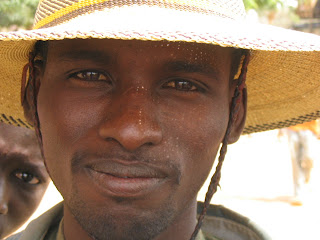
Led by: Mike Stroope, Dennis Wiles and Cindy Wiles
Dates: May 14-23, 2007
Location: Niger, West Africa
Join Mike, Dennis and Cindy on a tour of SW Niger to explore God’s calling for our churches to reach unreached peoples.
This tour will include:
- Exposure to unreached populations in both urban and rural settings
- Exploration of ways our churches can engage unreached peoples
- Hands-on opportunities to share your faith and Biblical Stories with lost people
- Interactive educational opportunities in the area of church planting
- Interaction with Great Commission workers from both Baptist and non-Baptist perspectives (to include SIM, SIL, CMA, IMB, non-denominational, European Baptist as well as local evangelists and leaders)
- Opportunities for you to assist pastors and leaders of small Fulani and Zarma churches in areas of Biblical study, church leadership and discipleship
Deadline for registration is March 23, 2007.
Cost per person: $2500
For more information contact Cindy Wiles at cindy.wiles@fbca.org or Miriam Plowman at miriam.plowman@fbca.org
by Mike Fritscher, Pastor Cottonwood Baptist Church
Cottonwood’s journey into becoming a Sending Community has not been instant nor has it been explosive. I think of our Church’s transformation into becoming a Sending People as markers! One of those markers was when Mike Stroope and a couple of his associates came to Cottonwood in January of 1999. The challenge from Mike’s heart to the heart of Cottonwood was one of a pursuit of God’s Glory to the ends of the earth. We came to believe that day God was calling us to declare His glory to the ends of the earth, at home and every place in between.
That Sunday night we began the journey of becoming a sent people. I do not recall the word “sent” being used that night. As a matter of fact it wasn’t until just a couple of years ago that we even began to specifically define ourselves as a sent people! We have churches who refer to themselves as “global”, “Great Commission Churches” or “missional” but rarely do we hear a church refer to themselves as a “Sent People”!
Say “Yes” to God’s Glory!
Nurturing our Church to become a sent people began when we said “Yes” to the Glory of God. We must understand there are regions and places in this world where Christ is neither mentioned nor worshipped. God’s plan has always been to use His people to declare His name to these people! For Cottonwood our “Yes” meant that we adopt an unreached people group where there was little to no access to the gospel and do whatever God called us to do to bring His glory to these people!
Find the People God Is Calling You To!
We knew God was calling us to a people who had never heard of Jesus. We sensed God’s call to a “closed” country in SE Asia where there are 100’s of “minority”, tribal groups where the gospel had not been proclaimed. I was invited to go on a trip to this country with other pastors and mission pastors. We traveled the country meeting with leaders and engaging unreached people groups (UPG’s). We returned from that country and soon sent a team of eight people who met with four different leaders who were working among four different UPG’s. Our team returned and reported their belief that God was calling us to the H people of Southeast Asia. The entire church rejoiced that day believing we were truly answering the call to declare His glory to the ends of the earth!
Start Sending Your People!
We began immediately sending our people to engage the H people. We began to partner with an existing team in the country by sending three families to live among these people for two years. They began to learn the language and engage the H. We also began sending short term teams who would spend anywhere from two weeks to three months working with local H communities. We have sent agricultural, ESL, medical, prayer walking and personnel support. For a number of years we felt this was the place God was calling us.
As the years unfolded, we began to sense God was inviting us to other peoples around the world! As a result of a continued “Yes” to His glory we have targeted other unreached peoples. We have begun to send our people to peoples in Mexico and Africa. We have also said “Yes” to the Navajo of Arizona.
Say “Yes” to the Glory of God in Your Life and Church!
Much of what we have become as a Sent people has been due to the pursuit of glorifying God not only among the nations but among the community of believers in our midst! We must say “Yes” to the glory of God in our individual lives! We are constantly challenging our people to believe God’s glory is to be reflected in their lives regardless of their involvement in engaging the nations. We believe that intimacy with God and others precedes ministry! So we work hard at presenting a transforming word. We teach the Glory of God is “Christ in you, the hope of glory”! Christ comes into our lives to crush the head of the enemy, take away sin, destroy the works of the enemy, and conform us into His image! We challenge our people to put to death the deeds of the flesh, to make sure they are right with God and with their neighbor. We believe as Believers our lives do not hinge on the Great Commission but on the Great Commandment! Jesus said to “Love the Lord your God with all of your heart, mind, soul and strength and to love your neighbor as yourself!” Then He said, “On these two commands depend the whole law and prophets!” We ask the question often, “Are we loving our neighbor well?”
We have seen when we promote this Christ-like character of holiness and love, our people are positioned to say “Yes” to anything and everything God calls them to do! Because God has called us to love our neighbor as ourselves we always ask the question, “Who is our neighbor?” The answer to that question for Cottonwood has been “the H people on the other side of the world, our family and church family at home and every person in between.” With that answer comes the resounding request of the body, “Here am I, send me!”
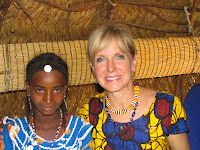
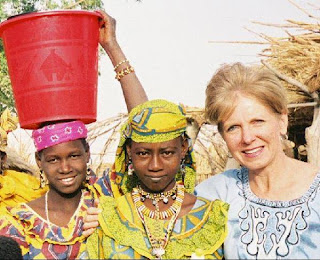
Continue to be in prayer for how our churches will invest in God’s call to the Nations and our willingness to walk this path. – Cindy Wiles
. . .All over the world this gospel is producing fruit and growing, just as it has been doing among you since the day you heard it and understood God’s grace in all its truth. – Colossians 1:6
Page 7 of 9« First«...56789»










